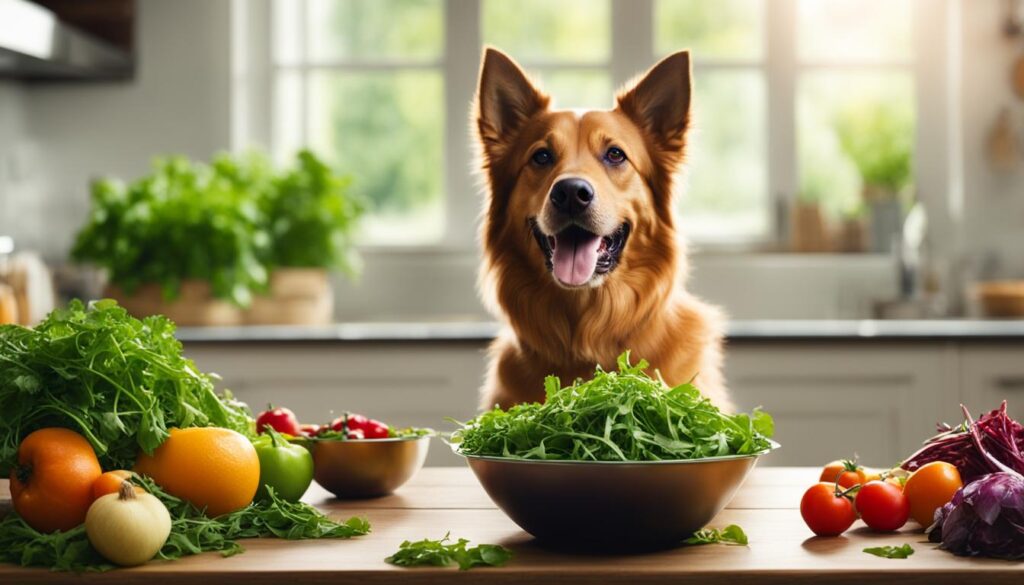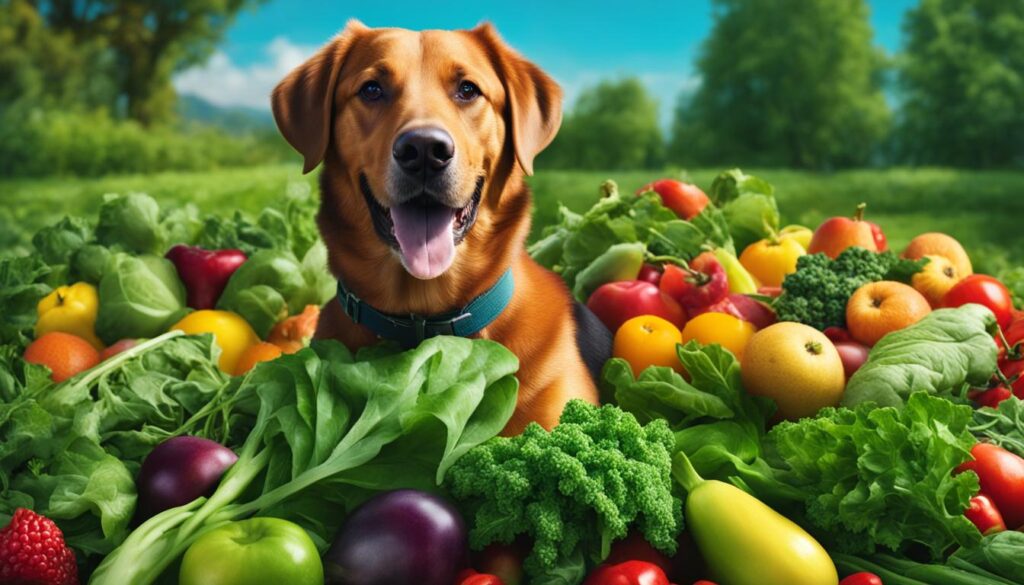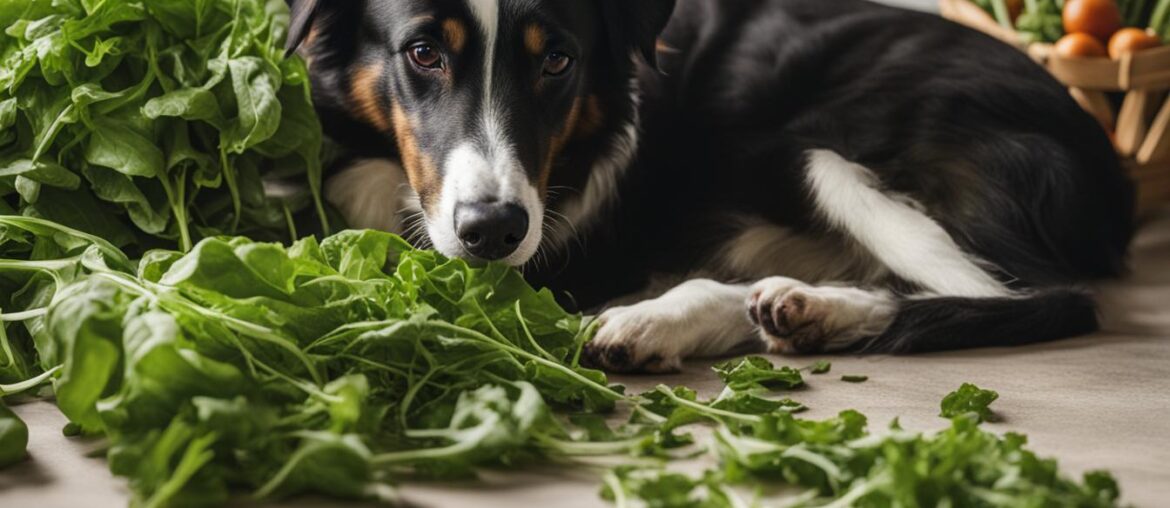As a responsible pet owner, you may often wonder about the safety of feeding certain foods to your furry friends. Arugula, with its peppery taste and vibrant green leaves, has gained popularity in human diets as a nutritious and flavorful ingredient. But can dogs enjoy this leafy green too?
When it comes to arugula, the good news is that it is generally safe for dogs to eat in moderation. In fact, it can offer several nutritional benefits for our canine companions. However, there are also important considerations to keep in mind to ensure your dog’s well-being when incorporating arugula into their diet.
Before you start sharing your salad with your furry friend, let’s explore the potential benefits of arugula for dogs and the risks associated with feeding it to them. By understanding these crucial details, you can make informed choices about whether arugula is suitable for your dog’s nutritional needs and overall health.
Key Takeaways:
- Arugula is generally safe for dogs to eat in moderation.
- It offers nutritional benefits such as immune system support and healthy digestion.
- Feeding arugula to dogs requires careful monitoring for any adverse reactions.
- Consult with your veterinarian before introducing arugula or any new food into your dog’s diet.
- Ensure that arugula is thoroughly washed and avoid adding seasonings or dressings that may be harmful to dogs.
Is Arugula Safe for Dogs to Eat?

Arugula is safe for dogs to eat in moderation. It doesn’t contain any toxins that could harm their health. However, dogs are primarily carnivores, so it’s important to ensure they’re also getting enough animal protein and healthy fats in their diet. Feeding arugula as an occasional treat or supplement to their regular meals is the best approach.
If you’re wondering, “Can dogs eat arugula?” the answer is yes. Arugula is a leafy green vegetable that can provide some nutritional benefits to your furry friend. Just remember to introduce it slowly and monitor your dog for any adverse reactions.
Feeding Arugula to Dogs: What You Need to Know
Arugula is a great source of vitamins and minerals, including vitamin K, vitamin C, calcium, and folate. These nutrients can support your dog’s overall health and well-being. However, it’s important to remember that arugula should only be a small part of your dog’s diet.
Here are some key points to keep in mind when feeding arugula to your dog:
- Moderation is key: While arugula is safe for dogs, it should be fed in moderation. Too much arugula can upset your dog’s stomach or cause digestive issues.
- Ensure a balanced diet: Arugula should not replace the main components of your dog’s diet, which should consist of high-quality animal protein, healthy fats, and other essential nutrients. Arugula should be considered as an addition or an occasional treat.
- Watch for allergies: Some dogs may be allergic or intolerant to arugula. Monitor your dog for any signs of an allergic reaction, such as itching, swelling, vomiting, or diarrhea. If your dog shows any of these symptoms, consult your veterinarian.
In summary, arugula can be a safe and nutritious addition to your dog’s diet when fed in moderation. However, always consult with your veterinarian before introducing any new food to your dog, especially if they have any underlying health conditions or dietary restrictions.
Benefits of Arugula for Dogs

Arugula offers several benefits for dogs, making it a valuable addition to their diet. Here are some of the key health benefits of incorporating arugula into your canine’s nutrition:
1. Immune System Support
Arugula is rich in vitamin C, which plays a crucial role in supporting the immune system of dogs. A strong immune system helps your furry friend fight off infections and stay healthy.
2. Healthy Digestion and Bowel Health
The fiber content in arugula can promote healthy digestion in dogs. It aids in regulating bowel movements and can prevent constipation. Furthermore, the fiber helps to maintain a healthy gut microbiome, supporting overall gastrointestinal health.
3. Essential for Bone Health
Arugula is a good source of calcium and vitamin K, both of which are vital for maintaining strong and healthy bones in dogs. Calcium is necessary for bone growth and maintenance, while vitamin K helps with proper blood clotting and bone formation.
4. Cardiovascular Function
Arugula contains nitrates, which have been shown to have beneficial effects on cardiovascular health. Nitrates can help to widen blood vessels, improving blood flow and potentially supporting heart health in dogs.
To provide a visual representation of the nutritional benefits of arugula for dogs, refer to the following table:
| Nutrient | Amount per 100g of Arugula |
|---|---|
| Vitamin C | 15 mg |
| Fiber | 1.6 g |
| Calcium | 160 mg |
| Vitamin K | 108.6 mcg |
| Nitrates | Under 100 mg |
The table provides an overview of the key nutrients found in arugula and their respective amounts per 100 grams of the vegetable.
By incorporating arugula into your dog’s diet, you can provide them with these essential nutrients and contribute to their overall health and well-being.
Risks of Feeding Arugula to Dogs

While arugula is generally safe for dogs, it’s important to be aware of the potential risks associated with feeding arugula to our furry friends. Understanding these risks can help us make informed decisions about incorporating arugula into their diet.
Arugula contains oxalates, which are naturally occurring compounds found in many leafy greens. These oxalates can form crystals in the urinary tract and lead to the development of kidney stones if consumed in large amounts over time. However, it’s worth noting that the levels of oxalates in arugula are relatively low compared to other vegetables, so the risk is generally minimal.
Another consideration is the presence of purines in arugula. Purines can be converted into uric acid in the body, and for dogs that are prone to bladder stones or urinary issues, excessive purine intake may exacerbate these conditions. If your dog has a known history of bladder stones or urinary problems, it’s best to consult with your veterinarian before introducing arugula into their diet.
Additionally, some dogs may be allergic or intolerant to arugula. Just like humans, dogs can have allergies to certain foods, and arugula is no exception. Common symptoms of arugula allergies in dogs may include itchiness, swelling, vomiting, or diarrhea. If you notice any of these symptoms after feeding your dog arugula, it’s essential to discontinue its consumption and consult with your veterinarian.
It’s crucial to introduce arugula slowly and in small amounts when feeding it to your dog for the first time. This allows you to monitor their reaction and ensure they tolerate it well. If your dog shows any signs of discomfort or an adverse reaction, it’s best to avoid feeding them arugula altogether.
“While arugula offers several health benefits for dogs, it’s crucial to be mindful of the potential risks. Understanding the impact of oxalates, purines, and the possibility of allergies can help us make informed decisions about incorporating arugula into their diet.”
To summarize, while arugula can be a healthy addition to your dog’s diet in moderation, it’s essential to be aware of the potential risks. Monitor their intake, introduce it gradually, and be watchful for any signs of adverse reactions. If you have any concerns or questions about feeding arugula to your dog, it’s always best to consult with your veterinarian for personalized guidance.
| Risks of Feeding Arugula to Dogs | Summary |
|---|---|
| Oxalates in arugula can lead to kidney stones with excessive consumption | The levels of oxalates in arugula are relatively low |
| Purines in arugula may be problematic for dogs prone to bladder stones or urinary issues | Consult a veterinarian if your dog has a history of bladder stones or urinary problems before introducing arugula |
| Some dogs may be allergic or intolerant to arugula | Discontinue consumption if your dog shows signs of allergies or adverse reactions |
Can Dogs Eat Fresh Arugula?

Dogs can eat fresh arugula, but it’s important to offer it in small amounts. Fresh arugula can be given as a treat or mixed with their regular food to add some variety and nutrition to their diet. However, it’s crucial to take certain precautions and considerations when feeding fresh arugula to dogs.
To begin with, ensure that the arugula is thoroughly washed to remove any dirt or pesticide residues. It’s best to opt for organic arugula whenever possible to minimize the potential exposure to harmful chemicals. Remember that dogs have sensitive digestive systems, so it’s essential to avoid dressings or seasonings, particularly store-bought ones that may contain ingredients that are toxic to dogs.
Olive oil can be used sparingly to dress arugula salads for dogs, as it is a safe and healthy addition. However, it’s vital to keep the amount of oil minimal to prevent any digestive issues. Remember, dogs have different dietary needs compared to humans, and it’s crucial to focus on a balanced and appropriate diet for their overall well-being.
In summary, dogs can enjoy fresh arugula, but it should be given in moderation and without any additional seasonings or dressings. By taking proper precautions and introducing fresh arugula gradually, you can provide your furry friend with a healthy and tasty treat.
| Can Dogs Eat Fresh Arugula? | Feeding Guidelines |
|---|---|
| Yes | Give in small amounts |
| No | Avoid adding dressings or seasonings |
| Yes | Wash thoroughly to remove dirt |
| Yes | Opt for organic arugula when possible |
| Yes | Use olive oil sparingly as a dressing |
Can Dogs Eat Cooked Arugula?
Dogs can safely eat cooked arugula as part of their diet. Cooking arugula can help reduce the levels of oxalates, making it easier for dogs to digest. It’s best to lightly steam or sauté the arugula and then mix it with their regular food to incorporate it into their meals.
When feeding cooked arugula to dogs, it’s important to exercise caution with seasonings or oils that may upset their stomach. Stick to simple preparation methods and avoid adding any ingredients that may be harmful to dogs, such as garlic or onions.
Cooked arugula can be a nutritious addition to a dog’s meal plan, providing additional vitamins, minerals, and fiber. However, it should be offered in moderation and as part of a balanced diet that includes other sources of protein and essential nutrients.
| Benefits of Feeding Cooked Arugula to Dogs |
|---|
| 1. Reduction of oxalates for better digestion |
| 2. Provides additional vitamins and minerals |
| 3. Adds fiber to promote digestive health |
Signs of a Dog Liking Arugula

Dogs that enjoy arugula may exhibit several signs indicating their enjoyment of this leafy green. These signs can serve as cues for pet owners to gauge their furry friend’s appreciation for this nutritious treat. Here are some common signs of a dog liking arugula:
- Staring: Dogs may fixate their gaze on the arugula, indicating their interest and desire to devour it.
- Alertness: Dogs become more attentive when presented with arugula, showing their anticipation and excitement.
- Wagging Tail: A wagging tail is a clear indication of happiness and enjoyment. Dogs may wag their tails vigorously when offered arugula.
- Pacing: Some dogs may exhibit restlessness or pacing when arugula is in sight, demonstrating their eagerness to try it.
- Lip Licking: Dogs may lick their lips in anticipation of the delicious flavors of arugula.
- Drooling: Salivating or drooling is a typical response when dogs encounter food they find appealing, including arugula.
- Stalking: Dogs may exhibit stalking behavior, mirroring their natural instinct to chase prey, as they approach the arugula.
- Ears Up: Dogs with perked-up ears are showing heightened curiosity and engagement with the arugula.
Dogs may also demonstrate their interest in arugula by jumping up, appearing when they hear the bag crinkle, or begging for more. These behaviors further highlight their enjoyment of this leafy green.
On the other hand, if a dog doesn’t like arugula, they may display signs of disinterest or displeasure. Some possible indications include ignoring the food, walking away, snarling, growling, or showing signs of disgust.
The image above visually represents a dog enjoying arugula, showcasing some of the signs mentioned.
History of Arugula and Dogs

Arugula, also known as rocket or salad rocket, has a fascinating history intertwined with human consumption and culinary traditions. However, its association with dogs is not as deeply rooted. While arugula has been cultivated and consumed by humans for centuries, it is not a commonly fed vegetable to dogs historically.
Arugula has ancient origins and has been mentioned in various ancient texts and depicted in artwork from centuries ago. It was highly regarded in Roman times and was prized for its unique peppery flavor and medicinal properties.
Over time, the popularity of arugula experienced fluctuations as culinary trends and preferences evolved. Despite its historical significance in human cuisine, arugula’s role in canine diets has not been well-documented or widely recognized until recent years.
In contemporary times, arugula has gained significant popularity among food enthusiasts and health-conscious individuals. Its distinct flavor, versatility, and nutritional benefits have contributed to its rise in popularity as a salad green and ingredient in various dishes.
Arugula Popularity
Arugula’s resurgence in popularity is attributed to multiple factors. Increased awareness and appreciation for diverse flavors, as well as the growing focus on incorporating fresh, nutritious ingredients into meals, have contributed to arugula’s appeal.
Furthermore, arugula’s nutritional profile, which includes vitamins A, C, and K, folate, and minerals, has positioned it as a desirable addition to a healthy diet. The peppery taste of arugula adds complexity and depth to salads, sandwiches, pasta dishes, and more.
While dogs may not have historically been exposed to arugula, its recent popularity among humans has sparked curiosity regarding its potential benefits for canine health.
| History of Arugula and Dogs | Arugula Popularity |
|---|---|
| Arugula has ancient origins and has been mentioned in various ancient texts and depicted in artwork from centuries ago. | Increased awareness and appreciation for diverse flavors, as well as the growing focus on incorporating fresh, nutritious ingredients into meals, have contributed to arugula’s appeal. |
| Arugula’s role in canine diets has not been well-documented or widely recognized until recent years. | The peppery taste of arugula adds complexity and depth to salads, sandwiches, pasta dishes, and more. |
Wrapping Up
In conclusion, arugula can be a safe and nutritious addition to a dog’s diet when fed in moderation. It provides several health benefits, including immune system support, digestion support, and promoting bone health. However, it’s important to be cautious of the potential risks associated with arugula, such as the presence of oxalates, purines, and the possibility of allergies or intolerances.
Dogs can enjoy both fresh and cooked arugula, but it’s crucial to introduce it slowly and monitor for any adverse reactions. As with any dietary changes, it’s recommended to consult with a veterinarian to ensure it aligns with your dog’s specific needs and health conditions.
Ultimately, arugula can be a healthy treat or occasional addition to your dog’s meals, but it should never replace a balanced and nutritious diet tailored to their individual requirements. By keeping portion sizes controlled and paying attention to your dog’s response, you can safely incorporate arugula into their meals and provide them with a variety of beneficial nutrients.
FAQ
Can dogs eat arugula?
Yes, arugula is generally safe for dogs to eat in moderation.
Is arugula safe for dogs to eat?
Yes, arugula is safe for dogs to eat as long as it is given in moderation.
What are the benefits of arugula for dogs?
Arugula offers several benefits for dogs, including immune system support, healthy digestion, and bone health.
Are there any risks associated with feeding arugula to dogs?
Yes, there are some risks, such as the presence of oxalates and purines, as well as the potential for allergies or intolerances.
Can dogs eat fresh arugula?
Yes, dogs can eat fresh arugula, but it should be given in small amounts as a treat or mixed with their regular food.
Can dogs eat cooked arugula?
Yes, dogs can eat cooked arugula. It’s best to lightly steam or sauté the arugula before feeding it to them.
What are the signs of a dog liking arugula?
Dogs that enjoy arugula may show signs such as staring, wagging tail, or showing interest in the food.
What is the history of arugula and dogs?
Arugula has a long history and has been mentioned in ancient texts and depicted in artwork. While it is not commonly fed to dogs historically, it does have nutritional benefits.
Can I feed arugula to my dog?
Yes, you can feed arugula to your dog, but it’s important to introduce it slowly and monitor for any adverse reactions.






